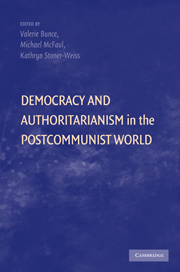Book contents
- Frontmatter
- Contents
- Prologue
- PART I WAVES OF REGIME CHANGE: FROM DICTATORSHIP TO DEMOCRACY…AND BACK?
- PART II ENCOURAGING DEMOCRACY: THE ROLE OF THE EUROPEAN UNION
- PART III CHOOSING REGIME CHANGE: DEMOCRATIZING ELECTIONS
- PART IV RESISTING REFORM: BACKSLIDING DEMOCRACIES AND ENDURING AUTOCRACIES
- Epilogue
- Index
- References
Epilogue
The Changing Character of the Global Struggle for Democracy
Published online by Cambridge University Press: 05 June 2012
- Frontmatter
- Contents
- Prologue
- PART I WAVES OF REGIME CHANGE: FROM DICTATORSHIP TO DEMOCRACY…AND BACK?
- PART II ENCOURAGING DEMOCRACY: THE ROLE OF THE EUROPEAN UNION
- PART III CHOOSING REGIME CHANGE: DEMOCRATIZING ELECTIONS
- PART IV RESISTING REFORM: BACKSLIDING DEMOCRACIES AND ENDURING AUTOCRACIES
- Epilogue
- Index
- References
Summary
THREE PUZZLES
The purpose of this volume has been to bring together a group of scholars with diverse areas of topical and geographical expertise to analyze variations over time and across country in regime trajectories in postcommunist Europe and Eurasia since the collapse of communism two decades ago. Our interest in this subject was motivated by our collective desire to address three puzzles posed not just by the postcommunist experience, but also, more generally, by regime transitions around the globe.
First, what explains the wide range of regime-types that formed after communism – a dynamic that is particularly surprising in view of a shared communist past and the extraordinarily invasive nature of the communist experiment? Although some new regimes in the region were fully democratic and some fully authoritarian, the dominant tendency in the early years after communism was the rise of hybrid regimes that straddled democracy and dictatorship and that reflected a compromise between authoritarians and democrats, with neither player able to dictate their preferred version of the rules of the political game. This is precisely the pattern, moreover, that we have seen in other countries that experienced transitions from authoritarian rule at the same time or later in the third wave of democratization.
- Type
- Chapter
- Information
- Democracy and Authoritarianism in the Postcommunist World , pp. 325 - 336Publisher: Cambridge University PressPrint publication year: 2009



